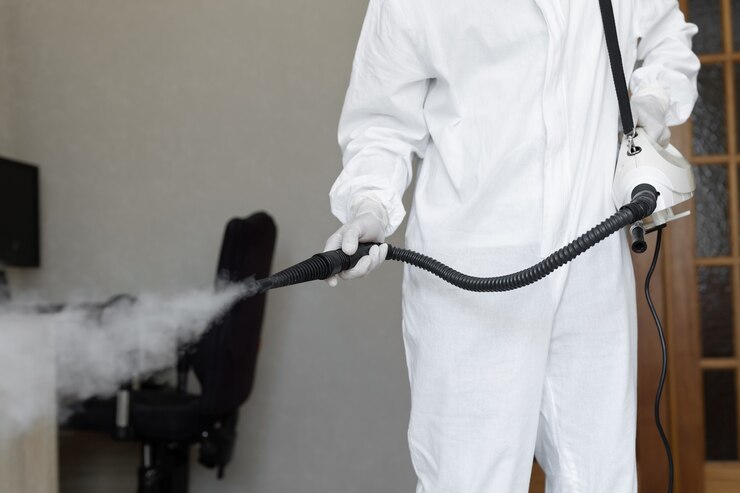How Much Do Pest Control Technicians Make?
The compensation of pest control technicians is a critical aspect to consider for those who are interested in pursuing a career in this industry. Pest control is a field that plays an essential role in public health and safety, managing and eliminating pests that can cause damage to property and pose health risks to humans and pets. The earnings of pest control technicians can vary based on a multitude of factors, including geographic location, experience, and education.
Salaries in pest control might also be influenced by the type of employer, whether it’s a small local business or a large national company, as well as the availability of extra income sources such as commission-based work or overtime. Experienced technicians might observe an increase in their earnings as they gain more years in the field, and additional certifications can potentially open doors to higher wages and advanced positions within the industry.
Key Takeaways
- Pest control technician salaries fluctuate based on experience, location, and additional qualifications.
- Growth opportunities and job satisfaction within the pest control industry can impact earnings.
- Access to resources and understanding industry trends are essential for career advancement in pest control.
Understanding Pest Control Technician Salaries
In assessing the earnings of pest control technicians, two main aspects are key: the various factors that can influence pay scales and the consolidated data representing average earnings in the field.
What Factors Influence Salary?
Several elements can affect a pest control technician’s salary. The individual’s level of experience often plays a significant role, with seasoned technicians generally earning more. Furthermore, the geographic location can lead to variations in pay due to differing cost of living and demand for services. Specialized skills may also boost a technician’s earning potential, with some reports indicating a substantial increase above the average for those with additional expertise.
What is the Average Salary Overview?
When looking at the broader financial picture for pest control technicians, salaries can vary widely. A snapshot of pay scales indicates that:
- The average hourly wage for a technician in the United States is around $19.37.
- Technicians with specialized skills can earn substantially more, in some cases up to 121.12% higher than the average base salary.
- Annual salaries fluctuate with the Federal Executive Branch paying an average of $59,160 annually, compared to $52,810 for state governments (excluding schools and hospitals).
- On the upper end of the scale, Minnesota purports an average hourly wage of $25.14 and an annual total of $52,290.
It is important to consider these figures as part of a wider spectrum, as individual salaries will vary based on the aforementioned factors influencing pay.
Geographical Variation in Pay
Salaries for pest control technicians can vary significantly depending on location. This variation is influenced by factors such as the cost of living, demand for services, and state or local economic conditions.
What Are the Top Paying States?
- Minnesota: Pest control technicians can expect to earn an average annual salary of $52,290, with an average hourly wage of $25.14.
- Colorado: Another state where technicians are compensated well.
- Washington: The state offers competitive wages for pest control professionals.
- New York: Includes a varied market with higher pay scales in some areas.
- California: Known for a higher cost of living, it typically offers higher wages to match.
How Does Pay Compare by Cities?
- Santa Cruz, CA: Offers higher wages, potentially due to a higher cost of living.
- Seattle, WA: Pest control technicians are paid competitive rates.
- Dallas, TX: The pay in Dallas aligns with Texas’s median salary ranges for this role.
- Chicago, IL: Has a strong demand for pest control services, which may influence pay.
- Phoenix, AZ: The salary can reflect the lower cost of living in Arizona compared to coastal states.
It’s noteworthy that cities within the same state can show considerable differences in salary, reflecting localized economic conditions and cost of living variations.
Experience and Earnings
In the pest control industry, a technician’s income is often closely tied to their level of experience. Entry-level positions typically start with lower wages, while technicians with years of experience can earn notably more, reflecting their advanced skills and knowledge.
How Does an Entry-Level Technician’s Salary Compare to an Experienced Technician’s Salary?
Entry-Level Technicians: Individuals just starting out in the pest control field can expect to earn starting wages. For instance, someone with less than 1 year experience may earn an average of around $15.52 per hour. Entry-level positions provide opportunities for on-the-job training, leading to potential salary increases with gained experience.
Experienced Technicians: Those who have cultivated their skills over the years have the potential to earn higher wages. For example, technicians with a mid-career level of 5-9 years experience can earn approximately $17.26 per hour. With advancement, pest control technicians with over 10-19 years of experience see an increase to about $18.13 per hour, and those in their late career with 20 years or more can make upwards of $18.00 per hour.
What Is the Salary Progression for a Pest Control Technician?
Salary progression in this field is often a direct reflection of advancing experience and potentially additional certifications or education. Pest control technicians can see a progressive increase in wages as they accumulate years of experience. The average salary for a pest control technician can vary broadly, with the median being around $47,287 per year. Those with specialty skills like Door-to-Door Experience can earn significantly more, sometimes up to 121.12% above the average base salary of $19.37 per hour.
As technicians continue to develop their expertise and potentially take on more complex tasks or management roles, their financial compensation reflects this career advancement. This can also include larger-scale projects or specialized pest management sectors that demand a higher level of expertise.
The Role of Education and Certifications
Understanding the specific factors that influence a pest control technician’s earnings is crucial. A technician’s level of education and certifications can directly impact their salary potential.
How Does Education Affect Wages?
In the pest control industry, individuals with higher levels of education often have the potential to earn higher wages. A high school diploma is typically the minimum requirement, but having additional education, such as an associate’s or bachelor’s degree, may offer opportunities for higher starting salaries and more rapid career advancement.
Why are Certifications and Licenses Important for Earnings?
Both certifications and licenses serve as credentials to verify a technician’s expertise and compliance with industry regulations. They indicate that someone has met a certain standard of knowledge and skill, which can justify higher compensation. For instance, becoming a licensed pest control technician might require studying and passing an exam, but it enables them to perform a wider range of services, thus increasing their earning potential.
Extra Income Sources
Pest control technicians may have opportunities to boost their income beyond their base salary. This can include earning commissions from sales or new contracts, receiving a share of company profits, or accruing extra income through overtime work and customer tips.
What Is Commission and Profit Sharing?
Commission-based earnings for technicians often come from selling services or contracts to new or existing customers. They stand to gain a percentage of the sales they generate, which provides an incentive for excellent customer service and salesmanship.
Profit sharing is another form of compensation whereby employees receive a share of the company’s profits. This amount varies depending on the company’s financial success and its policies concerning profit distribution.
How Can Overtime and Tips Contribute to Income?
Overtime pay enables technicians to earn additional wages at a rate typically higher than their standard hourly rate. This occurs when they work beyond their scheduled hours, and it’s often regulated by employment laws to ensure fair compensation.
Tips, though not guaranteed, can also supplement a technician’s income. Customers may offer tips as a form of gratitude for exceptional service, and this can add a variable, yet sometimes significant, amount to their overall earnings.
Industry Growth and Employment Trends
The pest control industry continues to offer stable employment opportunities, with modest growth anticipated in the coming years. Changes in job market trends indicate evolving opportunities for professionals within the industry.
What Does Bureau of Labor Statistics Data Indicate?
According to the Bureau of Labor Statistics (BLS), the field of pest control is experiencing consistent economic activity. The BLS data shows an average annual wage for pest control workers at approximately $51,170. Pest Control Workers across various metropolitan areas also exhibit varied employment levels, indicative of localized demand.
- Hourly mean wage: $24.60
- Employment per thousand jobs: Information detailed on BLS Statistics for Pest Control Workers
The BLS further projects the employment of pest control workers to grow by about 3 percent from 2022 to 2032. This growth rate aligns with the national average for all occupations, indicating a stable job outlook for the industry.
How is the Job Market Evolving for Pest Control Technicians?
The job market for pest control technicians is evolving due to several factors, including the necessity for specialized skillsto handle different pest types and the integration of technology into pest management practices. Job postings in this industry reflect the need for not only manual labor but also technological adeptness and evolving customer service skills.
- Job postings: Reflective of industry trends, they emphasize a blend of technical knowledge and soft skills.
- Skills demand: Indicates a push towards integrated pest management and eco-friendly practices.
Job openings are also influenced by the need to replace workers who move into other industries or retire, ensuring consistent job availability for new entrants into the pest control field. With a steady rate of job openings year over year, the industry’s employment trends are promising for those interested in this line of work.
Benefits and Job Satisfaction
When considering a career as a pest control technician, it’s important to assess both the tangible and intangible benefits. These professionals not only receive fair compensation for their work but often benefit from a range of health and retirement packages. Additionally, job fulfillment and work-life balance are critical aspects contributing to their overall job satisfaction.
What Are the Health and Retirement Benefits?
Pest control technicians typically have access to health insurance, including medical, dental, and vision plans. These benefits ensure that they and their families are protected in case of health issues. Regarding retirement benefits, companies frequently offer 401(k) plans, some with company match options, to aid in their long term financial security.
| Benefit Type | Details |
|---|---|
| Health Insurance | Medical, dental, and vision coverage |
| Retirement Savings | 401(k) plans, occasionally with employer contributions |
How Does Job Fulfillment and Work-Life Balance Contribute to Satisfaction?
Pest control technicians often experience a high level of job fulfillment due to the nature of their work. They solve complex problems and provide solutions that significantly improve clients’ living conditions, leading to a sense of accomplishment. Moreover, many pest control companies strive to offer work-life balance by providing flexible scheduling, which contributes to a positive work environment and allows technicians to maintain a satisfactory balance between their personal and professional lives.
- Problem-solving: Leads to a sense of accomplishment
- Flexible Scheduling: Enables work-life balance
Required Skills and Responsibilities
In the field of pest control, technicians are expected to possess a robust set of skills and undertake a wide range of responsibilities. Mastery in these areas is critical for effective management and elimination of pest issues.
What Are the Core Skills for Success?
Core skills for a successful pest control technician include knowledge of various types of pests and effective methods for their control or extermination. Technicians should be adept in the following:
- Identification: Accurate identification of insects and vermin.
- Chemical Use: Safe handling and application of pesticides, following state regulations and safety procedures.
- Customer service: Clear communication with property owners to understand their concerns and to provide instructions on prevention methods.
- Physical fitness: Technicians must be capable of handling the demands of the job, which may include lifting, bending, and working in tight spaces.
What Are the Typical Job Responsibilities?
The job responsibilities of a pest control technician often involve a range of tasks to manage and prevent infestations. Typical duties include:
- Inspections: Conduct thorough inspections of properties to assess pest problems.
- Treatment Plans: Develop and implement treatment plans to combat infestations.
- Supervision: Work under the guidance of a manager or supervisor to ensure procedures are followed accurately.
- Documentation: Record all activities, including applications of pesticides and advice given to property owners.
- Education: Informing clients on how to maintain their environment to prevent future pest issues.
A pest control specialist’s role is crucial in maintaining a safe and pest-free environment for residential and commercial properties. They must execute their responsibilities with precision while adhering to safety regulations and industry standards.
Furthering Your Career in Pest Control
Opportunities for career advancement for pest control technicians are tied closely to their pursuit of continuous training and education. They often start as entry-level technicians but can rise to supervisory or managerial roles.
What Are the Advancement Opportunities?
Pest control technicians have several avenues for advancement:
- Transition to a Managerial Role: After gaining experience, they can take on leadership positions such as crew leaders, supervisors, or even branch managers.
- Specialization: They might choose to specialize in certain types of pest control, such as termite extermination or fumigation, which can lead to higher pay and advanced roles within specialty departments.
How Does Continued Training and Education Contribute to Career Growth?
Continued education and training play a critical role in the growth of a pest control technician’s career:
- Certifications: Pursuing additional certifications can make technicians more valuable to their employers and clients. It may also be a requirement for certain promotions or specializations within the industry.
- Ongoing Education Courses: Staying updated with the latest pest control techniques and regulations not only ensures effectiveness on the job but also displays a commitment to the field, which is often recognized with career advancement opportunities.
Resource and Salary Information Platforms
When individuals are considering career options or searching for new job opportunities, they often seek resources that provide detailed salary information. Platforms such as Indeed, Glassdoor, and ZipRecruiter offer valuable insights into the earnings of pest control technicians across different regions and companies.
How Can One Utilize Online Salary Data?
Online salary databases are indispensable tools for job seekers. For instance, Indeed provides an accessible interface where individuals can find average hourly rates and yearly earnings for pest control technicians. The data is often accompanied by additional details like benefits, salary satisfaction, and potential for earnings growth based on possessing certain skills.
- Average Salary Info: Find median hourly and annual wage figures.
- Benefit Insights: Understand the value of non-wage compensation.
How Do Different Salary Surveys Compare?
It’s crucial to compare findings from different surveys to get a comprehensive view of a pest control technician’s potential earnings. Glassdoor not only offers salary data but also includes total pay estimates, which can encompass bonuses and additional compensation, providing a broader picture of a technician’s compensation.
- Comparison: Look across platforms for median and range salary figures.
- Salary Surveys: Check updated figures to reflect current market conditions.
By cross-referencing these platforms, one can gain a clearer understanding of the earning potential within the field of pest control, ensuring a well-rounded view of industry standards.
Adjusting for the Cost of Living
When evaluating pest control technician salaries, it’s essential to account for the cost of living in different areas. A salary that is above the national average in one city may not stretch as far in a city with a higher cost of living.
How Can Cost of Living Calculators Aid Technicians?
Cost of living calculators enable pest control technicians to gauge how their income will serve them in different geographical locations. These tools consider factors such as housing, groceries, utilities, transportation, and healthcare. By inputting the median salary figures, a technician can determine if they are earning a competitive wage that aligns with the living expenses of their specific region.
Is Relocation for Better Compensation a Viable Option?
Relocation can sometimes lead to better overall compensation when factoring in the cost of living. For example, while a technician may earn wages above the median in a high-cost area, they might achieve a higher standard of living by moving to a location where their salary is closer to the national average but the cost of living is significantly lower. This comparison emphasizes the importance of understanding both the absolute value of a salary and its relative purchasing power.
External Factors Influencing the Field
In the realm of pest control, technicians’ earnings are shaped not only by their skills and experience but also by varying external conditions. These factors can result in fluctuations in demand and alterations in salary prospects.
How Do Economic Conditions Affect Pest Control Technician Salaries?
Economic conditions play a pivotal role in determining the earning potential within the pest control field. In periods of economic strength, construction and real estate activities tend to accelerate, leading to an increased need for pest control services. A buoyant economy also means businesses and individuals are more willing to invest in regular pest maintenance, bolstering the demand for technicians.
Conversely, during an economic downturn, the pest control industry may experience a dip in demand as both commercial and residential clients cut back on non-essential services. The economic impacts of phenomena such as the COVID-19 pandemic have been significant, with initial industry contractions followed by recovery phases fueled by heightened awareness of sanitation and public health.
What Role Does Seasonality and Demand Play in Influencing Salaries?
The demand for pest control services demonstrates marked seasonality throughout the year. Pest activities naturally escalate during the warmer months, spurring a greater call for technicians and, thus, impacting their earning capacity. Summer and spring often bring about a surge in jobs dealing with insects and rodents, which can help to balance out the quieter colder months.
Technicians may also experience variable demand based on geographic location. Those operating in regions with generally mild climates might enjoy steadier year-round demand in contrast to their counterparts in regions with more marked seasonal shifts. This demand fluctuation can influence not only the number of available work hours but also potential overtime during peak seasons, affecting overall income.
Frequently Asked Questions
This section aims to address common inquiries about the earnings of pest control technicians, factors that affect their pay, and the financial aspects of a career in pest control.
What is the average hourly wage for a pest control technician?
The average hourly wage for a pest control technician in the United States is approximately $19.37.
What are the annual earnings for a pest control technician?
Annually, a pest control technician can make an average of $43,316, although this figure can vary based on location and experience.
What factors influence a pest control technician’s salary?
Experience, geographic location, certification, and additional skills are among the primary factors that can influence a pest control technician’s salary.
What is the salary range for pest control technicians at major companies like Terminix or Orkin?
Salaries at major pest control firms like Terminix and Orkin can vary widely, with the range typically falling between $28,401 and $42,501 in the United States.
Can a career in pest control provide a sustainable income?
Given the industry’s growth and demand for workers, a career in pest control can provide a sustainable income for many technicians.
What are the financial drawbacks of working as a pest control technician?
One potential financial drawback of working as a pest control technician could include potential fluctuations in workload seasonally, which might affect income stability.






